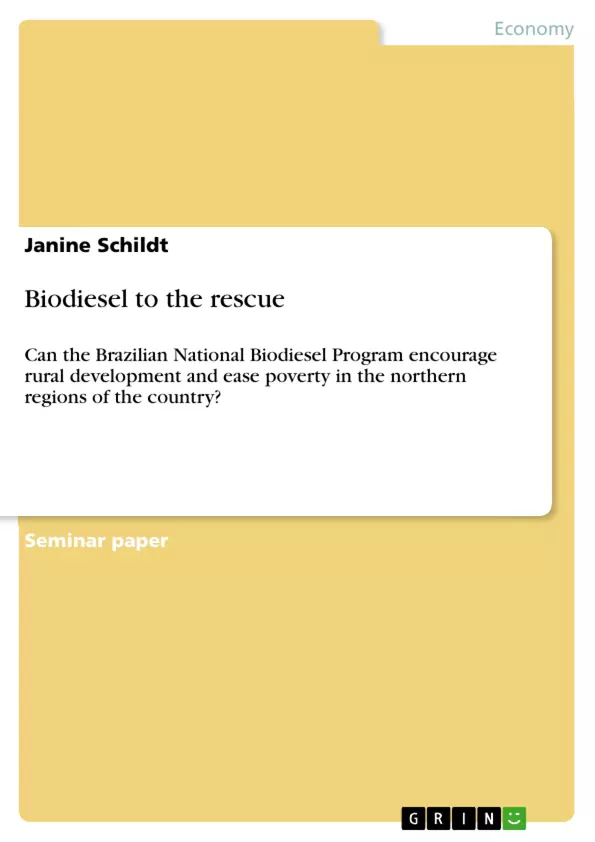The Brazilian Biodiesel Program (PNBP) is set out to reduce poverty in the underdeveloped
Northern regions of the country. It encourages family agriculture from plants such as castor
and palm which are not suitable for plantation farming through government subsidies and
low interest credits. The PNBP would have the potentials to reach its goals, if its design and
its administration were not half-hearted and the program prone to be sacrificed to the
interests of the over-powering soy lobby. Without a more genuine dedication to its social
focus, the PNBP is set out to end as a reprint of the highly subsidized ethanol program
benefiting car-owners instead of the rural poor.
Inhaltsverzeichnis (Table of Contents)
- 1. Introduction – Rural Poverty in Northern Brazil and Perspectives for Biodiesel Production
- 2. How to Reduce Poverty in Rural Areas – Some Theoretical Thoughts
- 3. The National Biodiesel Program and its Approaches Towards Rural Development and Poverty Reduction
- 4. Potential Achievements and Limitations of the Program
- 5. Conclusion - A less Prosperous and More Pessimistic Scenario
Zielsetzung und Themenschwerpunkte (Objectives and Key Themes)
This report aims to analyze the potential of the Brazilian National Biodiesel Program (PNBP) to contribute to rural development and poverty reduction in the country's underdeveloped northern regions. The report assesses the program's design, potential benefits, and limitations, drawing on theoretical insights and comparing it to the experience of the previous ethanol program, Proálcool.
- Rural poverty in Northern Brazil and its historical context
- Pro-poor growth and the role of agricultural development
- The potential of biodiesel for rural development and poverty reduction
- The PNBP's design and its alignment with sustainable development goals
- Challenges and limitations of the PNBP, including the influence of the soy lobby
Zusammenfassung der Kapitel (Chapter Summaries)
- Chapter 1: Introduction – Rural Poverty in Northern Brazil and Perspectives for Biodiesel Production: This chapter introduces the context of rural poverty in Northern Brazil, highlighting the historical disparities and the government's attempts to address them through biofuel programs. It contrasts the PNBP with the previous Proálcool program, examining the potential benefits of biodiesel for rural development and its suitability for the region.
- Chapter 2: How to Reduce Poverty in Rural Areas – Some Theoretical Thoughts: This chapter explores the theoretical framework of pro-poor growth, emphasizing the importance of agricultural development in reducing poverty and achieving equitable income distribution. It discusses how industrialization, while contributing to overall economic growth, often disproportionately benefits urban areas, neglecting rural populations.
- Chapter 3: The National Biodiesel Program and its Approaches Towards Rural Development and Poverty Reduction: This chapter delves into the design and implementation of the PNBP, focusing on its key features such as tax incentives, low-interest credits, and the promotion of family agriculture. It examines how the program aims to create employment opportunities and foster sustainable development in the North.
- Chapter 4: Potential Achievements and Limitations of the Program: This chapter analyzes the potential achievements of the PNBP, highlighting its potential to generate employment, increase rural incomes, and contribute to environmental sustainability. However, it also examines the program's limitations, such as the lack of land titles, the prevalence of exploitative contracts, and the influence of the soy lobby.
Schlüsselwörter (Keywords)
The report focuses on key concepts related to rural development, poverty reduction, biofuel programs, and the Brazilian agricultural sector. This includes terms such as pro-poor growth, family agriculture, biodiesel production, sustainable development, land tenure, and the influence of powerful agricultural lobbies like the soy industry.
Frequently Asked Questions
What is the main goal of the Brazilian Biodiesel Program (PNBP)?
The PNBP aims to reduce rural poverty in underdeveloped Northern regions of Brazil by encouraging family agriculture for biodiesel production.
How does the PNBP support family farmers?
It provides government subsidies, low-interest credits, and tax incentives for cultivating plants like castor and palm.
What are the main criticisms of the program?
The program is often seen as half-hearted and prone to being dominated by the interests of the powerful soy lobby, potentially neglecting the rural poor.
What is "pro-poor growth" in this context?
It refers to economic growth that specifically benefits the poor, particularly through agricultural development and equitable income distribution in rural areas.
How does the PNBP compare to the older ethanol program (Proálcool)?
There is a fear that the PNBP might end up like Proálcool, which highly subsidized ethanol but primarily benefited car owners rather than the rural poor.
- Citar trabajo
- Janine Schildt (Autor), 2008, Biodiesel to the rescue, Múnich, GRIN Verlag, https://www.grin.com/document/159977



